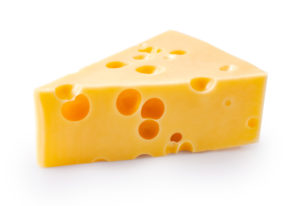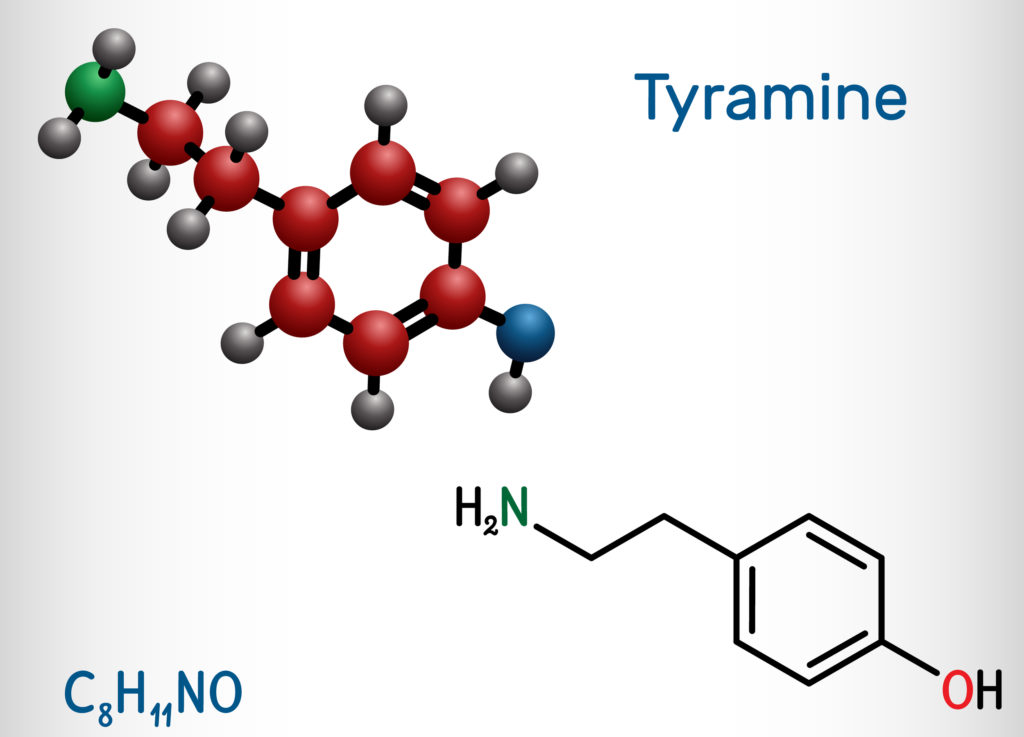What's On This Page?
Toggle I love cheese and eat all kinds of it, but that’s because I am among the lucky ones who has no genetic problems processing it. Today I’m going to talk a lot about cheese, just as one example to make the case against tyramine which causes headaches.
I love cheese and eat all kinds of it, but that’s because I am among the lucky ones who has no genetic problems processing it. Today I’m going to talk a lot about cheese, just as one example to make the case against tyramine which causes headaches.
Cheese has tyramine in it, and that’s bad for people who are prone to headaches and migraines. Tyramine itself is called a “monoamine” compound which means it has just one “amine” group in its structure. There’s a ton of tyramine in that cheese pizza, so try to notice if you develop head pain or spikes in blood pressure AFTER eating that. It could even take a day to manifest!
Do you know what breaks down monoamines when we produce them or eat them through cheese? A special oxidase enzyme that makes these otherwise powerful chemicals linger around too long and cause discomfort. In the tyramine case, as you can surmise, we need a “monamine oxidase” or MAO enzyme to break down all the Parmesan cheese in your fettuccine alfredo.
If you don’t have enough MAO, or you have a genetic propensity not to make enough of this specific enzyme, you will not be able to handle Parmesan and many other aged kinds of cheese without soon getting a headache, high blood pressure or anxiety.
The MAO Gene (The Cheese Gene)
Interestingly, MAO also breaks down dopamine, another important neurotransmitter and if there’s a slow-down in MAO your dopamine builds up and causes all kinds of haywire in the body! If MAO is running super fast (instead of slowly) it can burn up all the dopamine too quickly and this would be problematic to a person who has Parkinson’s disease. The reason is that a faster breakdown of dopamine by MAO exacerbates all the symptoms of Parkinson’s!
So in summary, your MAO enzymes can be balanced or they can run too fast, or too slow and that is just how the human body works! MAO is that important and the way your body works as an individual is based upon the MAO gene that your mom gives you. It’s passed down maternally.
There is a condition that they say is “rare” but it’s really not where a person has a deficiency of this MAO enzyme, and therefore they have trouble with the foods listed below. They may have other health concerns too.
This problem occurs mostly in men. The powers-that-be have dubbed this condition (which I think is really common) as “Monoamine oxidase A deficiency” which just means that there isn’t enough MAO handy to break down the foods you eat. What are the symptoms?
Behavioral problems, attention deficit, hyperactivity, insomnia, vivid or bad dreams, symptoms of the autism spectrum disorder, and possibly aggressive outbursts.
Monoamine oxidase A deficiency is a rare disorder that occurs almost exclusively in males. It is characterized by mild intellectual disability and behavioral problems beginning in early childhood. They all have problems with cheese.
Just a word of caution, if you take an SSRI drug for depression (such as fluoxetine or paroxetine, etc), or you make too much serotonin yourself… ore even if you take serotonin-increasing supplements like 5-HTP —-> do not, repeat DO NOT take an MAO inhibitor drug too! This will cause serotonin to rise to extremely dangerous levels.
Researchers figured this out long ago in the 1950’s when they developed antidepressant medications called MAO inhibitors which obviously block MAO enzyme from doing its job and breaking down cheese. People who took the medicine experienced spikes in blood pressure, nausea (or vomiting), heart palpitations and/or headaches whenever they ate foods containing tyramine (like cheese). See below for a complete list of potential tyramine-related symptoms.
No one is 100 percent sure why the tyramine triggers a migraine, but we have some ideas. Perhaps it has to do with an uptick in catecholamine production (specifically noradrenaline), or some vasoconstriction in the blood vessels or something else. Regardless, we know that lowering tyramine in your diet is a good thing if you are headache prone. Another way to say this is that cheese is a migrenade for some of you! That’s a term I use throughout my book entitled Headache Free, available HERE.
The umbrella categories of foods that can trigger tyramine-related problems include those that are cured, fermented, aged, curdled or soured. These are also the same foods that are highest in histamine by the way! Here I will list a handful of popular but problematic tyramine-rich foods which you should avoid if you have MAO problems:

Cheese, all of them (especially aged ones – Brie, Bleu, Parmesan, Gorgonzola, Swiss)
Sauerkraut
Sourdough bread
Bread containing yeast extract
Red Wine
Vermouth
Miso soup
Bean curd
Tofu
Tempeh
Natto
Soy and Teriyaki sauce
Aged meats like salami
Pickled herring
Smoked fish
Caviar
Tap beer
Leftovers in your fridge that are > 48 hours
Tyramine-related Symptoms
Migraine
Severe headache
Blurred vision
Confusion or difficulty thinking
Nausea or vomiting
Chest pain
Elevated blood pressure
Severe hypertensive crisis – May include symptoms above as well as signs of impending stroke
So those who are prone to tyramine headaches are those who have slow (or downregulated) MAO enzymatic pathways. For example:
1. Pregnant Women.
Prenatal stress has been linked to the downregulation of MOA (monoamine oxidase).
2. High Estrogen.
Do you know that if you have high estrogen (estradiol) levels, it will slow the MAO enzyme down and you will have more trouble with tyramine? People with high estradiol are often taking medications that contain estrogen, or producing too much endogenously, or dealing with methylation problems. Sometimes it’s genetic and of course, you can also experience elevations in estrogen from BPA in plastics and heavy metal exposure.
If you want to test your estrogen metabolites to see if you need to shift anything, there’s an at-home urine test you can take that is the premier test for hormones! It’s called DUTCH, you can get my free ebook about it here. xxx
3. Genetic SNPs in the MAO pathway.
Some people know they have a genetic problem with their MAO gene pathway because they’ve done genetic testing.
Here’s an example of someone who has a double homozygous SNP for this pathway and in his case, it means he does not handle tyramine well.

he may encounter symptoms with high loads of tyramine-containing foods.
4. B6 Deficiency
A person who is deficient in Vitamin B6 either due to poor nutrition or from taking a “drug mugger” of B6
Vitamin B6 is needed to finish the methylation pathway and form 5-MTHF (natural folate in the body), and without B6, this process cannot be accomplished. MAO inhibitor drugs (and SNPs in the pathway of MAO) will impact B6, and therefore suppress folate production in the body. If you have SNPs in this pathway (such as that shown in the pathway above, a little bit of B6 could be helpful).
I do realize this information is complex, and there is an interconnectedness with genes, vitamins, and disease states, so please talk to a qualified, holistic physician who understands all this. I am not a doctor, so I am unable to weigh in beyond the educational information presented here.
Summary and Helpful Hacks
If you have an MAO problem and you eat cheese and start to get a migraine I have a hack for you. The following items work to support the MAO pathway and break down tyramine a little faster than normal:
1. Riboflavin (vitamin B2)
2. Ginkgo biloba
3. Increase in intracellular levels of calcium – interestingly caffeine does this! And many of you know this but caffeine is sometimes used to abort migraine and it could be due to several factors including THIS.
If you need more help, there is a lot of information at the National Headache Foundation:
I’ve also written a book on the topic available HERE.
If you’d like to lower your tyramine levels, there is a DIET listed HERE.

Suzy Cohen, has been a licensed pharmacist for over 30 years and believes the best approach to chronic illness is a combination of natural medicine and conventional. She founded her own dietary supplement company specializing in custom-formulas, some of which have patents. With a special focus on functional medicine, thyroid health and drug nutrient depletion, Suzy is the author of several related books including Thyroid Healthy, Drug Muggers, Diabetes Without Drugs, and a nationally syndicated column.
